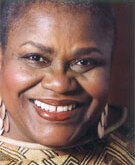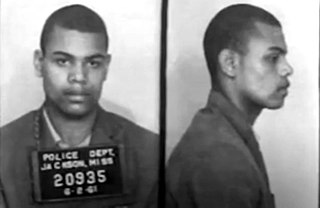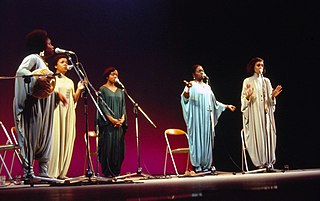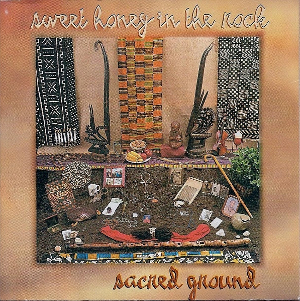
Sweet Honey in the Rock are an all-woman, African-American a cappella ensemble. They are a three-time Grammy Award–nominated troupe who express their history as black women through song, dance, and sign language. Originally a four-person ensemble, the group has expanded to five-part harmonies, with a sixth member acting as a sign-language interpreter. Although the members have changed over five decades, the group continues to sing and perform worldwide.

Bernice Johnson Reagon was an American song leader, composer, professor of American history, curator at the Smithsonian, and social activist. In the early 1960s, she was a founding member of the Freedom Singers, organized by the Student Non-violent Coordinating Committee (SNCC) in the Albany Movement for civil rights in Georgia. In 1973, she founded the all-black female a cappella ensemble Sweet Honey in the Rock, based in Washington, D.C. Reagon, along with other members of the SNCC Freedom Singers, realized the power of collective singing to unify the disparate groups who began to work together in the 1964 Freedom Summer protests in the South.
"After a song", Reagon recalled, "the differences between us were not so great. Somehow, making a song required an expression of that which was common to us all.... This music was like an instrument, like holding a tool in your hand."
Carol Lynn Maillard is an American actress, singer, and composer. She is one of the founding members of the Grammy Award-winning a cappella ensemble Sweet Honey in the Rock.

Maria Luisa McKee is an American singer-songwriter. She is best known for her work with Lone Justice, her 1990 song "Show Me Heaven", and her song "If Love Is a Red Dress " from the film Pulp Fiction.

Toshi Reagon is an American musician of folk, blues, gospel, rock and funk, as well as a composer, curator, and producer.

Tor Lars Oskar Endresen is a Norwegian singer and composer.

"Sweet Home Chicago" is a blues standard first recorded by Robert Johnson in 1936. Although he is often credited as the songwriter, several songs have been identified as precedents. The song has become a popular anthem for the city of Chicago despite ambiguity in Johnson's original lyrics. Numerous artists have interpreted the song in a variety of styles.

"Marching Song of the First Arkansas Colored Regiment" is one of the few Civil War-era songs inspired by the lyrical structure of "The Battle Hymn of the Republic" and the tune of "John Brown's Body" that is still performed and recorded today. The "Marching Song" has been described as "a powerful early statement of black pride, militancy, and desire for full equality, revealing the aspirations of black soldiers for Reconstruction as well as anticipating the spirit of the civil rights movement of the 1960s." The song's lyrics are attributed to the regiment's white officer, Captain Lindley Miller. An almost identical song, "The Valiant Soldiers," is attributed to Sojourner Truth in post-Civil War editions of her Narrative. Recent scholarship supports Miller as the original author, or at least compiler, of the song.

Cordell Hull Reagon was an American singer and activist. He was the founding member of The Freedom Singers of the Student Nonviolent Coordinating Committee (SNCC), a leader of the Albany Movement and a Freedom Rider during the Civil Rights Movement.

The Freedom Singers originated as a quartet formed in 1962 at Albany State College in Albany, Georgia. After folk singer Pete Seeger witnessed the power of their congregational-style of singing, which fused black Baptist a cappella church singing with popular music at the time, as well as protest songs and chants. Churches were considered to be safe spaces, acting as a shelter from the racism of the outside world. As a result, churches paved the way for the creation of the freedom song. After witnessing the influence of freedom songs, Seeger suggested The Freedom Singers as a touring group to the SNCC executive secretary James Forman as a way to fuel future campaigns. Intrinsically connected, their performances drew aid and support to the Student Nonviolent Coordinating Committee (SNCC) during the emerging civil rights movement. As a result, communal song became essential to empowering and educating audiences about civil rights issues and a powerful social weapon of influence in the fight against Jim Crow segregation. Their most notable song “We Shall Not Be Moved” translated from the original Freedom Singers to the second generation of Freedom Singers, and finally to the Freedom Voices, made up of field secretaries from SNCC. "We Shall Not Be Moved" is considered by many to be the "face" of the Civil Rights movement. Rutha Mae Harris, a former freedom singer, speculated that without the music force of broad communal singing, the civil rights movement may not have resonated beyond the struggles of the Jim Crow South. Since the Freedom Singers were so successful, a second group was created called the Freedom Voices.

Gonna Let It Shine: A Concert for the Holidays, is a live album by American folk singer Odetta, released in 2005. It was recorded at Fordham University in New York City for a public radio broadcast.

Fellowship is the fourth studio album by an American singer Lizz Wright, which was released on 28 September 2010 on Verve Forecast. Guest performances on the album include Meshell Ndegeocello, Bernice Johnson Reagon, Joan as Policewoman and Angélique Kidjo. The album debuted at No. 2 on the Billboard Jazz Album chart, and has sold 17,000 copies in the United States as of August 2015.

Every Mother Counts is a charity compilation album and soundtrack for Christy Turlington's 2010 documentary film No Woman, No Cry by various artists, released by Starbucks' record label Hear Music on April 12, 2011. Featuring fifteen tracks about motherhood, some of which are original and previously unreleased, the compilation was sold exclusively at Starbucks locations and benefited the CARE's maternal health initiatives and the Every Mother Counts foundation. The album debuted at number 83 on the Billboard 200.
Charles "Chuck" Neblett is a civil rights activist best known for helping to found and being a member of The Freedom Singers.

"Bye and Bye We're (or, I'm) Going to See the King" is a Christian song from the African-American musical tradition. It is known by a variety of titles, including "I Wouldn't Mind Dying (If Dying Was All)" and "A Mother's Last Word to Her Daughter". It was recorded seven times before 1930, using the preceding titles.

"Let Your Light Shine on Me" is a traditional gospel blues song, having been recorded by The Wiseman Quartet in 1923, by Ernest Phipps in 1928, and by Blind Willie Johnson in 1929. The song itself is also known as "Shine On Me", "Let It Shine on Me", "Light from the Lighthouse" and "Light from Your Lighthouse".
"Trouble Will Soon Be Over" is a traditional gospel blues song recorded in 1929 by Blind Willie Johnson and Willis B. Harris, who is thought to have been his first wife.

The Complete Blind Willie Johnson is a compilation album of all the known recordings by American gospel blues singer-guitarist Blind Willie Johnson. As part of the Roots N' Blues series, it was released jointly by Columbia Records and Legacy Recordings, on April 27, 1993. All of the tracks on the two-compact disc set were originally issued by Columbia on the then-standard two-sided 78 rpm record format.

Yasmeen Williams is an American gospel singer and former member of the African American a cappella ensemble Sweet Honey in the Rock.

Sacred Ground is an album by the American a capella group Sweet Honey in the Rock, released in 1995. The group supported the album with a North American tour.

















